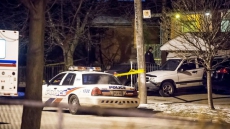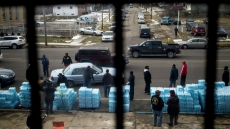OTTAWA — Democratic Institutions Minister Maryam Monsef concedes Canada's first-past-the-post electoral system has its advantages.
And, whatever its flaws, she acknowledges it would be welcomed in fledgling democracies like Afghanistan, from whence she fled as a youngster.
But a mature democracy like Canada can do better, she says.
Monsef has been put in charge of delivering on Prime Minister Justin Trudeau's pledge to make last fall's federal election the last conducted under FPTP.
The objective, she says, is to engage voters, improve turn out during elections and make all Canadians feel like their votes count.
That means "a stronger democratic system that allows for a higher voter turnout, that engages the voices of those who at the moment feel like they're ignored, those who feel like their issues don't matter and that their hopes and aspirations don't count," Monsef said in an interview.
"We have an opportunity, with this government as we approach the 150th anniversary, to strengthen and modernize our democratic institutions and bring them into the 21st Century and that is the mandate that we got from Canadians."
Monsef has used the mandate argument to deflect Conservative demands for a Canada-wide referendum on whatever electoral reform is eventually recommended by a soon-to-be-constituted, special all-party committee.
In the interview, she continued to throw cold water on the referendum idea, but didn't absolutely rule it out.
"We need to consider different ways of voting, yes, but we also need to consider online voting, we also need to consider mandatory voting. There are some who suggest that we need to consider the voting age...
"So, to reduce this national conversation to a simple 'Yes' or 'No' is taking a short cut and doing a great disservice to Canadians and to this incredible opportunity we have here to engage Canadians."
Still, Monsef said she's "not ready to commit" to a categorical rejection of a referendum.
In the meantime, she said the all-party committee can decide for itself how to conduct broad consultations with Canadians. She'll be conducting her own extensive consultations at the same time, she added.

Referendums have shot down electoral reform proposals in British Columbia, Ontario and P.E.I. On a national scale, a referendum would be even more difficult, with any proposal having to garner signficant support in all regions, if not all provinces.
Some polls have suggested Canadians aren't particularly keen on changing the familiar FPTP system, in which the candidate who wins the most votes in a riding wins the seat, frequently with considerably less than 50 per cent of the vote.
But Monsef scoffed at the suggestion that all her consultations might produce a consensus to stick with the status quo.
"Our entire campaign platform was based on the conversations that the prime minister had across the country for years and so ... we heard Canadians and we developed a set of proposals accordingly."
The Conservatives have accused Trudeau of planning to rig the system to ensure Liberal election victories in perpetuity.
Trudeau has in the past expressed a personal preference for a ranked ballot system, in which voters rank their preferences and trailing candidates' second choices are counted until one emerges with more than 50 per cent of the vote.
Conservatives contend that would favour the centrist Liberals, who are most likely to be the second choice of other parties' supporters.
However, Monsef noted that Trudeau has specifically asked her to explore all options, including various models of proportional representation. And she said one of the reasons he chose her to lead on the file is precisely because she has "no preconceived notions."
"I have no preference and it's quite liberating to bring that level of objectivity to a file like this one."



